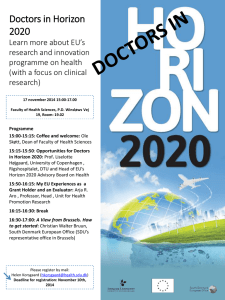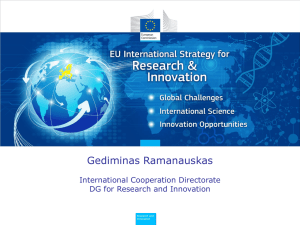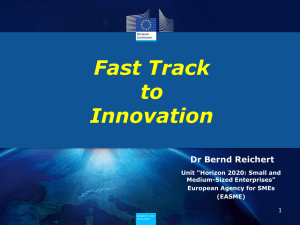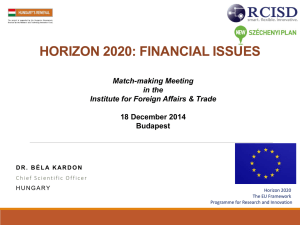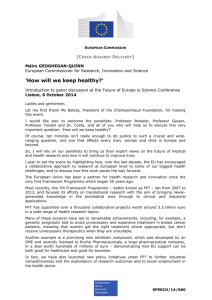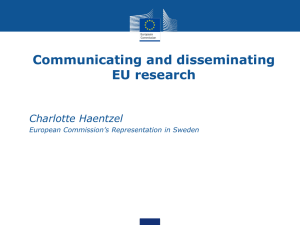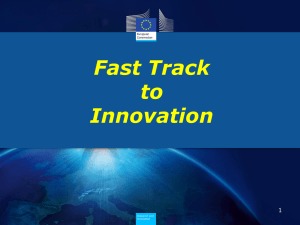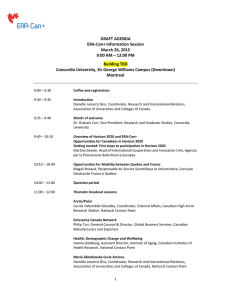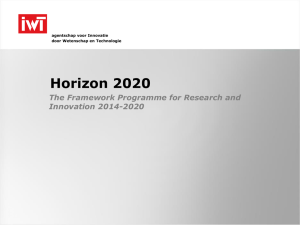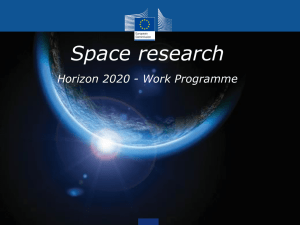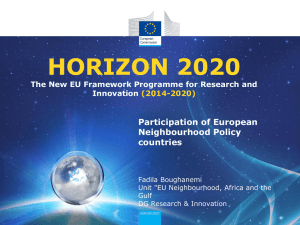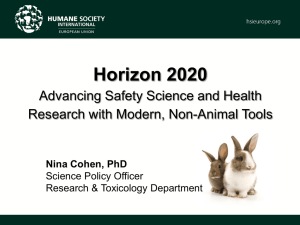DOC - Europa
advertisement
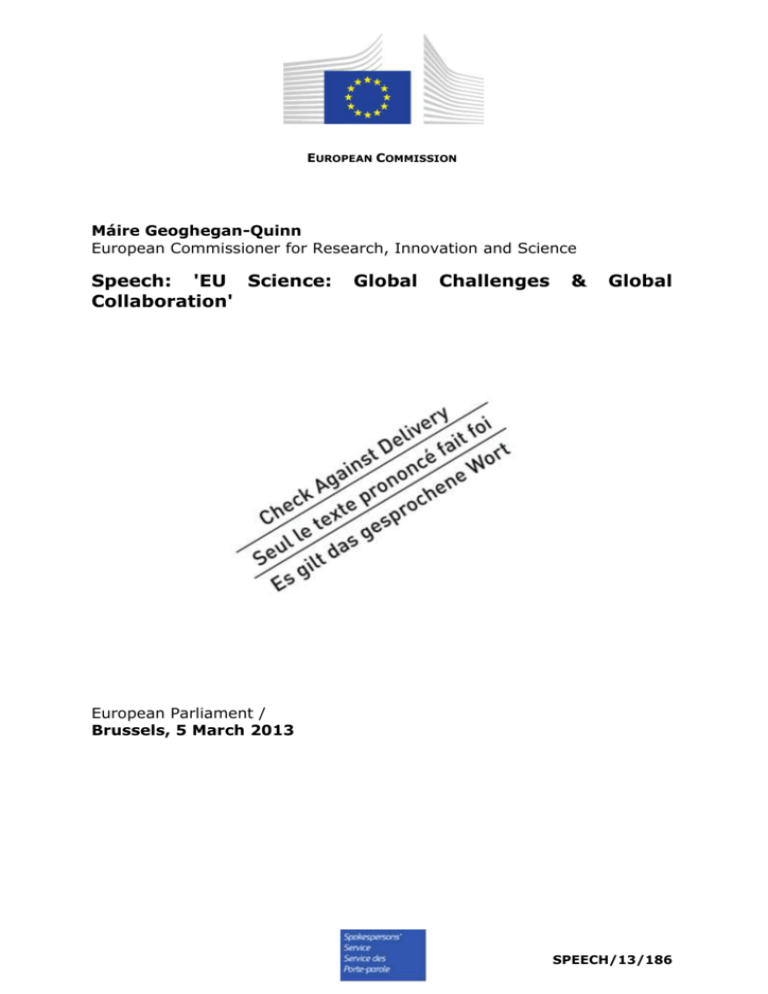
EUROPEAN COMMISSION Máire Geoghegan-Quinn European Commissioner for Research, Innovation and Science Speech: 'EU Science: Collaboration' Global Challenges & Global European Parliament / Brussels, 5 March 2013 SPEECH/13/186 Mr Cookson, Ladies and gentlemen, I am delighted to have the opportunity to talk to you about Global Challenges and Global Collaboration for EU science. We are living in exciting, if challenging, times with profound changes to the global research and innovation landscape. Growth economies such as China, India, Russia or South Africa are transforming themselves, and investing strongly in their research and innovation base. More and more scientific publications are co-authored by scientists from different countries, while multinational companies are increasingly investing in research and innovation outside their home countries. This is to be welcomed, because the challenges that we face today such as climate change, public health or energy supply affect people across the globe, and require global solutions. The European Union is an excellent place to perform research. While we account for just 7% of the world’s population, we’re responsible for 24% of research expenditure, 32% of high-impact publications and 32% of patent applications. We have traditionally strong links with partners such as the United States and Japan, and we’re strengthening our links with fast-growing economies. And like everyone, we are keen to improve our competitiveness, and we can do this by ensuring that our researchers, innovators and businesses have access to knowledge, including the knowledge produced outside our own borders. At the same time, strengthening our collaborations opens up mutual market access for our companies. For all these reasons, international cooperation remains a crucial part of our research and innovation policy at European level, and it is a vital component of our new programme for Research and Innovation, Horizon 2020. The strategy we’re adopting under Horizon 2020 builds on the achievements of the 7th Framework Programme - or FP7 - that comes to an end this December. For example, FP7 has been supporting the European and Developing Countries Clinical Trials Partnership, in which 14 EU Member States, Norway and Switzerland, cooperate with sub-Saharan countries in the battle against HIV/Aids, malaria and tuberculosis. Researchers from 80 different countries have participated in the immensely successful Marie Sklodowska-Curie actions, while the European Research Council funds scientists from anywhere in the world to conduct their research in Europe. ITER is another flagship project. Together with China, India, Japan, Russia, South Korea and the United States, we are attempting to demonstrate the viability of nuclear fusion as an energy source. Rare diseases research is a prime example of the advantages of international cooperation, which can maximise scarce resources, share data and coordinate research efforts that might not be viable on a smaller scale. The International Rare Diseases Research Consortium (IRDiRC) was launched in April 2011 to foster international collaboration in diagnosing rare diseases and developing new therapies. 2 The Joint Research Centre also provides dozens of good examples of international cooperation, such as in the fields of nuclear safety and the prevention and mitigation of natural disasters. The level of cooperation is such that around 20% of the projects funded by FP7 include at least one international partner in its consortium. Around 5.4% of all FP7 participants come from ‘third countries’, with the top five sources being Russia, the USA, China, India and South Africa. While we have done a lot to foster international cooperation, we’re not resting on our laurels. We have much more to do. That is why last September the Commission adopted a new strategy for international cooperation in research and innovation. The strategy lays down three key objectives: First: Strengthening excellence in research and innovation by facilitating access to knowledge, people and markets across the globe. Second: Tackling global challenges. We need to cooperate internationally to tackle the major societal challenges that I mentioned earlier. Third: Supporting external policies. Many of the international commitments that the EU has signed up to, such as the Millennium Development Goals, are underpinned by research and innovation. Horizon 2020, the new EU programme for research and innovation due to start in 2014 will be the main tool for implementing our international cooperation strategy. Horizon 2020 will be open to participation from all countries, but we will be a bit more restrictive as regards providing funding from the EU budget. This is to take account of the fact that a number of countries have invested so strongly in their research and innovation base that they are now able to cooperate on an equal footing. In addition, there will be targeted cooperation actions. It will be up to policymakers to decide upfront both the area and the partner for cooperation. The targeted actions will be selected on the basis of common interest and mutual benefit, and in some cases will be developed from the ongoing dialogues with our global partners. In terms of the countries and regions with whom to cooperate, the Strategy identifies three groupings: Enlargement and neighbourhood countries and EFTA (Iceland, Norway, Switzerland and Liechtenstein). The focus is on fostering these countries' integration into, or alignment with, the European Research Area, including through their possible association to Horizon 2020. Industrialised countries and emerging economies, where the focus is strongly on competitiveness, access to knowledge and markets; and, Developing countries, where the accent is on enhancing the research and innovation capacities of these countries to assist them in their socio-economic development and in tackling the challenges most relevant to them. The resulting targeted actions will be clearly laid out in a set of multi-annual roadmaps that will specify for each country and region the topics on which we wish to cooperate. The roadmaps will subsequently be implemented through a range of instruments including collaborative projects, networking between projects or joint initiatives between the EU and third countries, such as coordinated calls. 3 In addition to these funding actions, a specific point of attention of the new strategy will be to promote common principles for engaging in international cooperation. These principles, to be mutually agreed between the Union and international partners, will enable researchers from across the globe to collaborate in full confidence. We will work to create a level playing field for research and innovation with common principles on issues such as research integrity, gender and open access. The protection of intellectual property will be particularly important as we move to Horizon 2020 and its increased support for innovation activities. This strategy also represents the further development of the international dimension of the European Research Area, and in this respect it is essential to deepen our work with Member States on international cooperation. In this respect, important progress has been made through the Strategic Forum for International Science and Technology Cooperation, where important steps have been taken to move forward common strategic research and innovation agendas, for instance with India. Launching this strategy has only been the first step. Making it work will require the full and visible integration of international cooperation into Horizon 2020 and a sound governance structure. As part of this governance and to ensure that we stay on track, the Commission will produce a report every two years to measure progress and assess impact. The first report, planned for early 2014, will also contain the first multi-annual roadmaps. Ladies and gentlemen, research and innovation are vital elements of the Union's future. They are also essential ingredients of any approach that seeks to address today's global challenges. Europe is reaching out to the world to join forces in addressing those challenges. I wish you all an interesting conference and fruitful discussions. Thank you. 4
